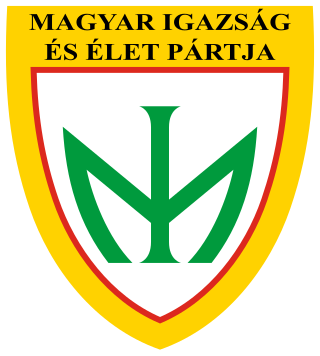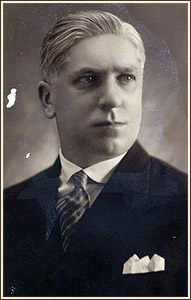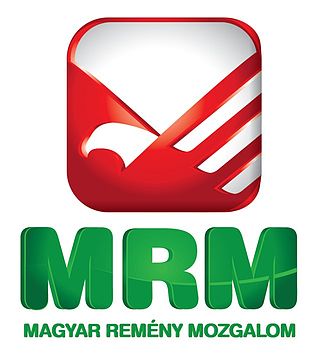Related Research Articles
The Irish Independent is an Irish daily newspaper and online publication which is owned by Independent News & Media (INM), a subsidiary of Mediahuis.

The Hungarian Justice and Life Party was a nationalist political party in Hungary that was founded by István Csurka in 1993.

Népszabadság was a major Hungarian newspaper which was formerly the official press organ of the Hungarian Socialist Workers' Party during the Hungarian People's Republic. Before its closure, Népszabadság was considered the de facto newspaper of record for Hungary.

The Jobbik – Conservatives, commonly known as Jobbik, is a conservative political party in Hungary.

Magyar Gárda Mozgalom founded by Magyar Gárda Hagyományőrző és Kulturális Egyesület was a patriotic-nationalistic association somewhat mimicking an army in its organisation and paraphernalia. It was coined a paramilitary, a party-militia, or – sarcastically – an operetta-guard by its opponents and certain media outlets, even though it was never armed. It was in varyingly close relationship with the Jobbik party in Hungary. It was founded through an "oath of loyalty to Hungary" by its members in Buda Castle, Budapest, on 25 August 2007. It was dissolved by the Budapest Tribunal on 2 July 2009. The president of the Association was Gábor Vona, and it had such prominent members as former (1990–1994) defence minister Lajos Für and actor Mátyás Usztics.

The Sixty-Four Counties Youth Movement is a far-right movement originating in Hungary and also present in Romania, Slovakia and Serbia, advocating the unification of all ethnic Hungarians that live outside of Hungary and the revision of the Treaty of Trianon from 1920, which defined the current borders of the Hungarian state. Until 2013 the leader of the 64 Counties Youth Movement was László Toroczkai.

László Toroczkai is a Hungarian politician, journalist, leader of the Our Homeland Movement political party, and former mayor of Ásotthalom. He is also a member of the Parliamentary Assembly of the Council of Europe. He is also a founding member of the HVIM youth organization, the Hunnia national radical movement, and former Vice President of Jobbik. Between 2002 and 2013 he served as editor-in-chief of the Magyar Jelen newspaper.

Budapest Pride, or Budapest Pride Film and Cultural Festival, is Hungary's largest annual LGBT event. Of the week-long festival, the march is the most visible event. The march has historically been known under several names, including Budapest Gay Dignity Procession, and has taken place each year since 1997, usually on the first Saturday of July, proceeding along Budapest's most expansive thoroughfare, Andrássy Avenue, between the City Park (Városliget) and Elizabeth Square. Though much smaller in scale than similar gay pride parades in Western Europe and the Americas, around one to two thousand marchers typically participate in the Budapest procession. Radical right-wing demonstrators and hooligans have severely disrupted the Budapest Pride marches held in 2007 and 2008, casting uncertainty over the future of the event. However, Budapest Pride has been held successfully in the intervening years, with minimal incidents.

Endre Kálmán Bajcsy-Zsilinszky, was an influential Hungarian national radical politician and an important voice in the struggle against German expansion and military policy. Executed National Resistant by the Hungarist Arrow Cross Party.

Dóra Dúró is a Hungarian politician of the Our Homeland Movement, formerly spokesperson of the far-right nationalist political party Jobbik.

Előd Novák is a Hungarian politician. He was one of the deputy chairmen of the far-right political party, Jobbik. His wife is Dóra Dúró, a former spokesperson for the party.

Hungarian nationalism developed in the late 18th century and early 19th century along the classic lines of scholarly interest leading to political nationalism and mass participation. In the 1790s, Hungarian nobles pushed for the adoption of Hungarian as the official language rather than Latin.

The Hungarian Hope Movement (Hungarian: Magyar Remény Mozgalom ; Serbian: Покрет Мађарске Наде, Pokret Mađarske Nade was a right-wing political party organized by some members of the Hungarian minority in Voivodina, Serbia. It claimed that its aim was to represent the interests for the benefit of all Hungarian people living in the country. Based upon a similar ideological background, it preferred the affiliation with the Movement for a Better Hungary, which is a radical and nationalist party in Hungary.

The Hungarian People's Party of Transylvania was a political party representing the Hungarian minority in Romania. It was founded in 2011.
The Magyar Sziget festival is a nationalist festival organised in the Hungarian city of Verőce, by the Sixty-Four Counties Youth Movement (HVIM) under the leadership of László Toroczkai. In 2015 the location was changed to Velence. The name itself is an example of the feeling of isolation of Hungary. It can be seen as a metaphor for the 'island' of Hungary within a sea of non-Finno-Ugric languages. The festival is not to be confused with the 'normal' Hungarian Sziget festival.

Gregory Johnson is an American white nationalist and advocate for a white ethnostate. He is known for his role as editor-in-chief of the white nationalist imprint Counter-Currents Publishing, which he founded in 2010 with Michael Polignano.
Force and Determination was a far-right Hungarian nationalist political movement founded on 8 July, 2017, by dissident members of Jobbik during that parties effort to moderate its platform.

Our Homeland Movement is a Hungarian far-right political party. It was founded by Ásotthalom mayor and former Jobbik Vice-President, László Toroczkai, along with other Jobbik dissidents that left the organization after the party's leadership moved away from its radical beginnings.

Origo is a major Hungarian-language news website founded in 1998 by telecommunications company MATÁV. In 2018, Origo was the third most visited Hungarian website. Since 2015, Origo has been regularly criticised by the left for its uncritical support of the Fidesz political party. Multiple critics described the website as "state-run propaganda", prone to operate with the same keywords for emotional mobilization as other news outlets with close ties to Fidesz.

The Galileo Circle was an atheist-materialist student organization that functioned in Budapest between 1908 and 1919. Their center was located at the Anker Köz in Terézváros, Budapest. The circle had several subgroups with four different world views: the radical liberals, the Marxists, the anarcho-syndicalists and the socialists. However they had common goals, which included the protection of free scientific research and thinking at universities, the cultivation of social sciences, the social assistance of poor students, the spread of anti-clericalist and atheist views, the support of anti-nationalism and promoting internationalism, the propagation of anti-alcoholism, the opposition to large estates and the "reorientation of Hungarian social perception".
References
- 1 2 "A special holiday offer for everyone who bought our Jewish-Gypsy onslaught conspiracy". Politics. 27 April 2011. Retrieved 15 November 2014.
- ↑ "National Portrait Gallery: László Toroczkai". Hungarian Ambiance. 16 June 2009. Retrieved 15 November 2014.
- ↑ László Molnár (1 November 2010). "Anti-Semitism in Hungary". Jerusalem Center for Public Affairs. Retrieved 15 November 2014.
- ↑ Manuel Mireanu (29 April 2013). "The Spectacle of Security in the Case of Hungarian". Left East. Retrieved 15 November 2014.
- 1 2 3 4 "Radikális restart a kormányzati és a sátáni propaganda ellen" [Radical restart against government and satanic propaganda]. Index (in Hungarian). 1 September 2020. Retrieved 11 April 2023.